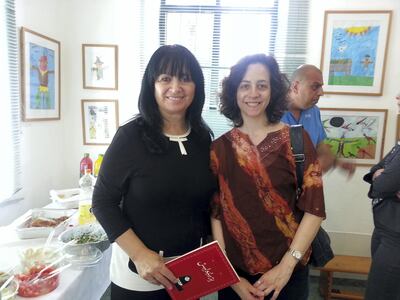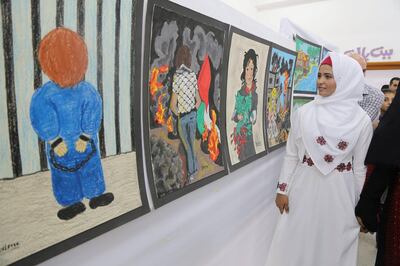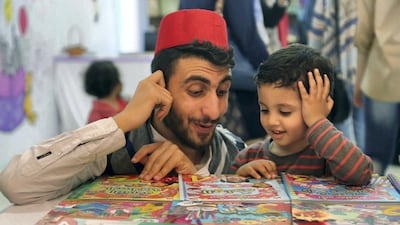The word "matloub", Arabic for "wanted" has taken on two distinct meanings since it was attached to a new international "library-solidarity" project, which gathers books for Palestinian libraries.
First, organisers underline that the books they are soliciting are wanted, as in desired by Palestinian readers. But they also intend to evoke the criminalised sense of wanted, as in: outlawed, hunted and thrown behind bars.
The Matloub/Wanted project was born out of meetings between the international group, Librarians and Archivists with Palestine (LAP) and Palestinian library workers. LAP organisers first travelled to Palestine as a group in 2013. One of its members, Maggie Schreiner, recalls how during that first trip they saw many old books that had been "charitably" offloaded on to Palestinian libraries.
“We visited libraries where international donors had essentially dumped excess books, such as out-of-date textbooks.
“These books were unwanted by the recipient libraries, completely inappropriate for the libraries’ patrons, and took up a lot of physical space.”
How it works
The Matloub project inverts this process. Instead of starting with what's undesirable and thus cheaply available, they start by asking what readers want. Eleven libraries in the West Bank and six in Gaza submit lists of titles they would like to see on their shelves. These requests are processed by the Tamer Institute for Community Education, an award-winning Palestinian NGO, and make their way to a special section of the LAP website: matloub.librarianswithpalestine.org.
There, visitors from around the world can browse titles and choose a book or two to donate. This way, instead of shelves packed with copies of the 1984 edition of Modern Biology, Palestinian library patrons can discover fun, relevant and newly released titles.
But this project is not just about sharing books with Palestinian libraries. "We also liked the double entendre, present in both the English and Arabic words, of 'wanted' in a crime sort of sense," LAP's Melissa Morrone said. "Literature is as much subject to Israeli criminalisation and oppression as are the other dimensions of people's lives, creative and otherwise, and we want this project to make that clear."
How the project began
The initiative began when Hannah Mermelstein, who had been leading delegations to Palestine for nearly a decade, shifted career paths and became a librarian. A couple of years into her new job, fellow librarian Jenna Freedman asked her, "How about a delegation of librarians?"

The first few members put out a call for applications and received more than double the amount they could accept. The group drew up a small budget and crowdfunded their way to Palestine, where they shared their expertise and learnt from Palestinian library workers. As Mermelstein said early on, the group is not looking to enact a “politics of witness”, as many delegations to Palestine are. Instead, they want to establish mutually beneficial relationships.
Palestine, Mermelstein says, is “so used to being witnessed in a uni-directional manner, it is not always easy to establish the kinds of relationships that are truly multidirectional. A shared professional identity definitely helps with that, but we’ve had to work at building trust and ongoing relationships with our partners on the ground”.
Learning more about Palestinian libraries
Although it might not seem so at first, Matloub/Wanted is also a multidirectional project. A school librarian in Detroit, Dublin or Dubai, for example, could go to the website and buy a book for a library in Tammoum. But they can also benefit from the experience of the librarians in Tammoum, using the lists on Matloub as inspiration for their own Arabic collections. International publishers could also discover in-demand books that might be interesting to translate into other languages.

LAP has launched a number of activities in the past few years. It ran a campaign to bring two Palestinian librarians to the American Library Association’s 2016 conference, and they also led a worldwide book group called “One Book, Many Communities”.
Indeed, Palestinian libraries and archives have so many needs that at times, it’s difficult to know where to start. “One of the reasons we love Matloub,” Mermelstein said, “is that it’s a way to raise awareness about many of those issues around access to literature, while at the same time responding to a direct need.”
The Matloub website itself foregrounds awareness-raising, and it provides information about each of the participating libraries as well as the library landscape across Palestine. LAP organisers say they hope visitors to the site won't donate a book as a one-time act, but rather that the project will encourage them to "learn more about the conditions under which Palestinian libraries operate".
For instance, visitors to the Matloub website will find a link beneath each book that asks: "Why is shipping so expensive?" Here, the shipping cost isn't a simple DHL fee, but represents the total cost of getting the book to the requesting library. Elsewhere on the site, organisers explain the difficulties of moving books into and around the country in greater detail.
“Even books published in Palestine have a hard time finding their way from Akka or Haifa, for example, to Ramallah or Nablus, and vice versa. Checkpoints, roadblocks and ID laws prevent books, as well as people, from crossing arbitrary borders, and Gaza is completely isolated from the rest of Palestine; indeed from the world.”
What's next?
The website is careful to note that, just because you bought a copy of Rania Zabeeb Dhaher's Maza fi Batn Mama? (What's in Mommy's Belly?) it does not mean this book will ship immediately to the library that chose it.
Donations build up so that books can be shipped together, and the Tamer Institute has to strike a balance. Although it will indeed purchase books listed on the site, it also wants to make sure "all libraries receive relatively equal numbers".
Nevertheless, the possibilities for the project’s future, Schreiner says, are many. They include “resource lists, web comics tracing the journeys that books can take into the West Bank or Gaza, and even animated videos”.
The group may be small, but they are – like Palestinian library leaders – extremely adept at making much from whatever they have.


